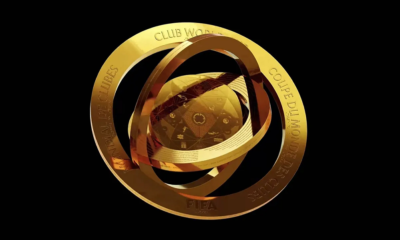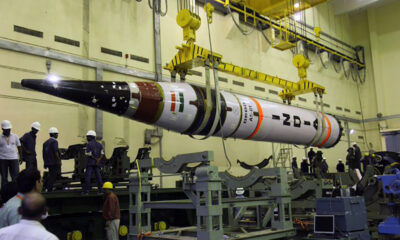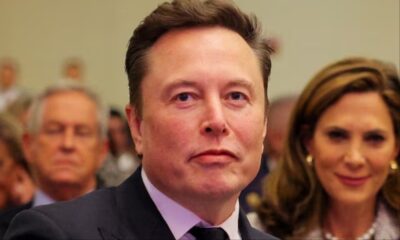Science & Technology
Elon Musk hands drivers first Teslas from new German gigafactory
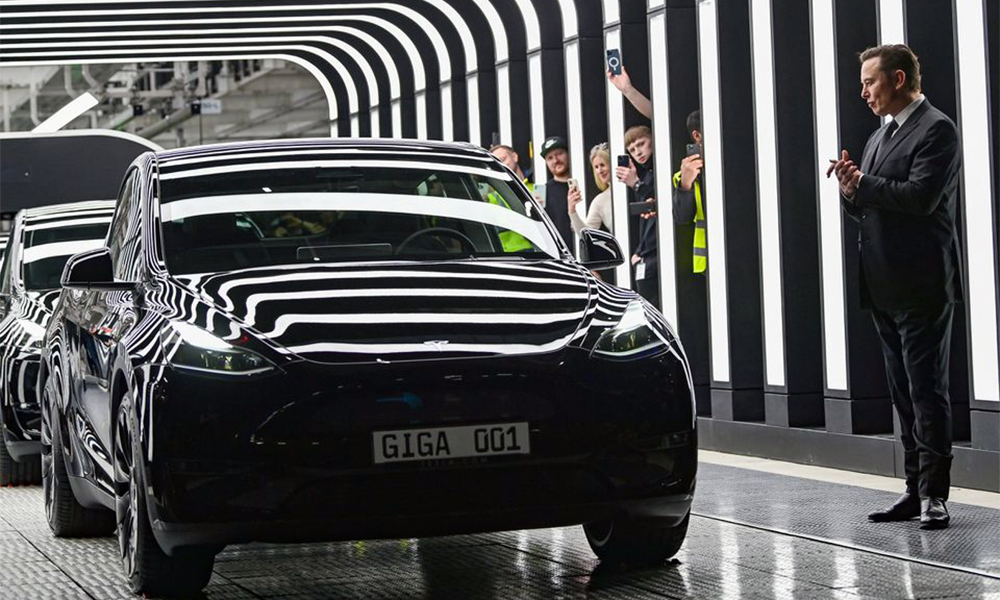
Elon Musk was cheered as he oversaw the handover of Tesla's (TSLA.O) first German-made cars at its Gruenheide plant on Tuesday, marking the start of the U.S. automaker's inaugural European hub just two years after it was first announced.
Loud music played as 30 clients and their families got a first glimpse of their shining new vehicles through a glitzy, neon-lit Tesla branded tunnel, clapping and cheering as Tesla Chief Executive Musk danced and joked with fans.
"This is a great day for the factory," Musk said, describing it as "another step in the direction of a sustainable future".
Musk said that Tesla is likely to launch a test version of its new "Full Self-Driving" software in Europe, possibly next year depending on regulatory approval.
"It's quite difficult to do full self-driving in Europe," he told factory workers on Tuesday, saying much work needs to be done to handle tricky driving situations in Europe where roads vary a lot by country.
Although German Chancellor Olaf Scholz, who also attended the event, lauded the gigafactory as the future of the car industry, it has faced opposition and some environmental activists blocked the factory's entrance while displaying banners flagging its high water use.
Two protestors abseiled from a motorway sign near the factory, blocking traffic for hours after the event.
Musk had hoped to begin output from the factory eight months ago, but licensing delays and local concerns around the plant's environmental impact held up the process.
Tesla was forced to service European orders from Shanghai while it awaited its German licence, adding to rising logistics costs at a time when it was struggling with industry-wide chip shortages and other supply chain disruptions.
It got the final go-ahead from local authorities on March 4 to begin production in Germany, provided it met conditions ranging from its water use to air pollution controls.
The plant opening came on the same day as the top U.S. securities regulator urged a federal judge not to let Musk back out of an agreement requiring that his Twitter use be monitored.
Tesla shares ended up 7.9% at their highest level in more than two months on Tuesday.
RACE WITH VW
The new owners received the Model Y Performance configuration, a vehicle costing 63,990 euros ($70,500) with a 514 km (320 miles) range, Tesla said, adding that new orders from the plant could be delivered from April.
Tesla said that around 3,500 of the plant's expected 12,000 workers have been hired so far.
At full capacity, the plant will produce 500,000 cars a year, more than the 450,000 battery-electric vehicles that German rival Volkswagen (VOWG_p.DE) sold globally in 2021.
It will also eventually generate 50 gigawatt hours (GWh) of battery power, surpassing all other plants in Germany. Tesla is expected to initially import batteries from China for its German-made Model Ys before it starts local battery production.
Musk said on Tuesday that battery production will be a "challenge" next year and will be "the limiting factor" in the coming years, as Tesla aims to aggressively boost vehicle production.
For now, Volkswagen still has the inside track in the race to electrify Europe's fleet, with a 25% market share to Tesla's 13%. Musk has said ramping up production would take longer than the two years it took to build the plant.
JPMorgan predicted Gruenheide would produce around 54,000 cars in 2022, increasing to 280,000 in 2023 and 500,000 by 2025.
Volkswagen, which has received 95,000 EV orders in Europe this year, is planning a new 2 billion euro EV factory alongside its existing facility in Wolfsburg and six battery plants across Europe.
But its timeline lags Tesla's, with the EV factory due to open in 2026 and the first battery plant in 2023.
Science & Technology
Russia fines Google more than the world’s total GDP over YouTube bans

Russia has fined Google $2.5 decillion after the US tech giant took action against pro-Kremlin TV channels on YouTube following Moscow’s invasion of Ukraine.
Russia imposed a daily fine four years ago - a fine that has since swelled to an unprecedented level - ($20,000,000,000,000,000,000,000,000,000,000,000 - a 33-digit figure).
To put this into perspective, global GDP reaches an estimated $110 thousand billion (12-digit figure), according to the IMF.
Speaking to Russia’s TASS news agency, one expert, Roman Yankovsky from the HSE Institute of Education, said Google “clearly will not pay this penalty, and the Russian Federation will not be able to recover this money from the company."
Euronews reported that a short calculation shows that he is right.
Google's holding company, Alphabet, has a market capitalisation of slightly more than $2 trillion. Even with earnings of $80.54 billion from the last quarter, the tech giant doesn’t seem to be able to afford to pay the fine.
Google first barred pro-Moscow channel Tsargrad TV, which is owned by oligarch Konstantin Malofeev, four years ago.
At the time, Google was fined a daily penalty of 100,000 roubles and warned that amount would double every 24 hours if it went unpaid.
The original fine has been compounded by further penalties after Google eventually blocked a total of 17 Russian TV channels as a result of international sanctions, The Telegraph reported.
The tech giant now owes a staggering $2.5 decillion.
Science & Technology
Apple launches new iPad mini with AI features
Apple said it would roll out the first set of AI features in the U.S. version of the English language this month through a software update with iPadOS 18.1.
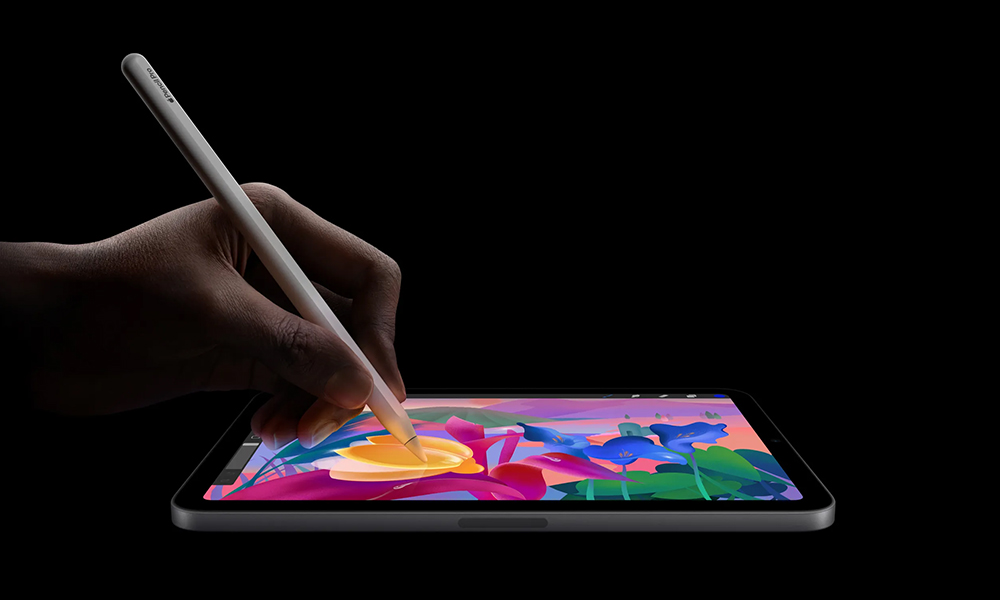
Apple on Tuesday launched its new generation of the iPad mini packed with AI features including writing tools and an improved Siri assistant, as the iPhone maker races to boost its devices with artificial-intelligence capabilities, Reuters reported.
The new iPad mini is powered by Apple's A17 Pro chip, which is used in the iPhone 15 Pro and Pro Max models. With a six-core central processing unit, the A17 Pro would boost CPU performance by 30% compared to the current generation iPad minis and is central to running Apple Intelligence, Apple's AI software.
Apple said it would roll out the first set of AI features in the U.S. version of the English language this month through a software update with iPadOS 18.1.
The features will be available for iPads with A17 Pro or M1 chips and later generations, Apple said, adding it will roll out additional features including image-generation tools, Genmoji and ChatGPT-powered capabilities over the next several months, read the report.
Apple in September unveiled its long-awaited, AI-boosted iPhone 16 lineup, but with the AI features still in test mode, the company failed to excite some investors while early sales data raised some questions around demand.
Still, research firm Canalys on Monday said the iPhone 16 would help Apple's sales in the fourth quarter and drive momentum into the first half of 2025, after Apple reached a record high third-quarter shipments.
The iPad mini, starting at $499, is available for pre-orders starting on Tuesday and will begin arriving to customers and Apple store locations next week, Apple said.
Science & Technology
Iran sends satellites to Russia for rocket launch
In September, Iran carried out its second satellite launch this year using a rocket built by its Revolutionary Guards
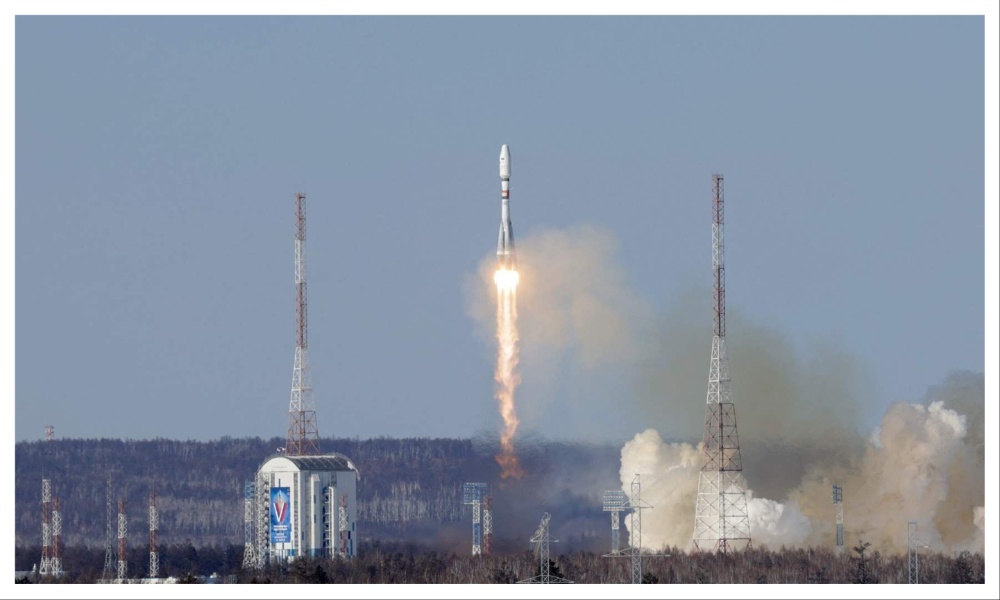
Iran has sent two locally made satellites to Russia to be put into orbit by a Russian space vehicle, the semi-official news agency Tasnim reported on Saturday, in the latest space cooperation between the two U.S.-sanctioned countries.
The development of Kowsar, a high-resolution imaging satellite, and Hodhod, a small communications satellite, is the first substantial effort by Iran's private space sector, the report said.
Russia sent Iranian satellites into orbit in February and in 2022, when U.S. officials voiced concern over space cooperation between Russia and Iran, fearing the satellite will not only help Russia in Ukraine but also help Iran monitor potential military targets in Israel and the wider Middle East, Reuters reported.
Kowsar could be used in agriculture, natural resource management, environmental monitoring, and disaster management, Tasnim said.
Hodhod is designed for satellite-based communications and could be used in remote areas with little access to terrestrial networks.
In September, Iran carried out its second satellite launch, this year using a rocket built by its Revolutionary Guards.
The launch came as the United States and European countries accuse Tehran of transferring ballistic missiles to Russia that could be used in its war with Ukraine. Iran has denied this.
-

 World4 days ago
World4 days agoBiden is sending aid to help Ukraine keep fighting next year, Blinken says
-

 Tahawol4 days ago
Tahawol4 days agoTahawol: NATO’s concern over proximity of Russia & North Korea discussed
-
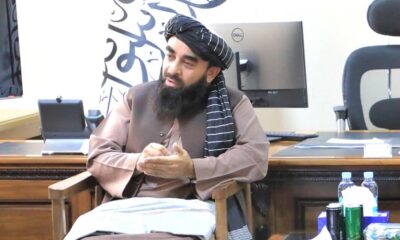
 Latest News4 days ago
Latest News4 days agoIEA committed to freedom of media within Islamic principles: Mujahid
-
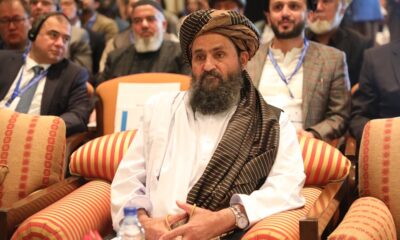
 Latest News4 days ago
Latest News4 days agoIEA prioritizing poverty reduction and job opportunities, says deputy PM
-

 4 days ago
4 days agoAWCC customer in Kandahar wins 1 million AFN in ‘lucky lottery’
-
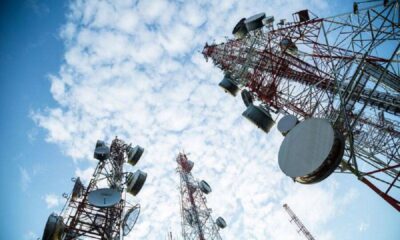
 Latest News4 days ago
Latest News4 days agoIEA cuts mobile phone and internet rates
-
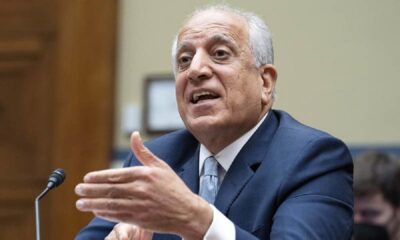
 Latest News4 days ago
Latest News4 days agoKhalilzad: Turning our back on Afghanistan would not be wise
-
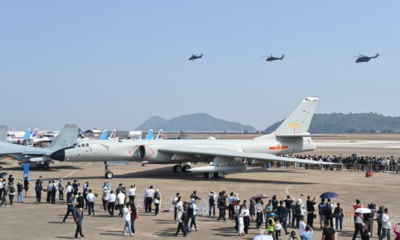
 World4 days ago
World4 days agoChina’s largest air show off to flying start with fighter jets and attack drones


